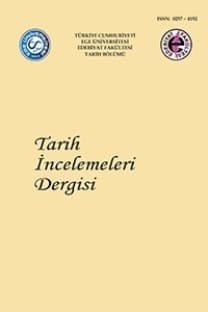Papalık Hizmetinde Kardinal Bessarion’un Türklere Karşı Haçlı Seferi Çağrısı
Kardinal Bessarion, Papalık, Haçlı Seferi, Mantua, Roma, İtalya
At the Papacy’s Service Cardinal Bessarion’s Call to the Crusade against the Turks
___
- KAYNAKLAR Bisaha 2004 Nancy Bisaha, “Pope Pius II and the Crusade, Crusading in the Fifteenth Century: Message and Impact, ed. N. Housley, New York: Palgrave Macmillan, s. 39-52. Frazze 2004 Charles A. Frazze, “İstanbul’un Fethinden Sonra Osmanlıların Kazanımları ve Katoliklerin Tepkisi”, (çev. Mehmet Şahin), Selçuk Üniversitesi İlahiyat Fakültesi Dergisi, S. 17, s. 211- 236. Gill 1975 Joseph Gill, “The Sincerity of Bessarion the Unionist”, The Journal of Theological Studies, New Series, Vol. 26/2, s. 377- 392. Glasschröder 1890 F. X. Glasschröder, “Zur deutschen Legation des Cardinals Bessarion 1460”, Römische Quartalschrift für christliche Altertumskunde und für Kirchengeschichte, 4, s. 65-68. Hankins 1990 James Hankins, Plato in the Italian Renaissance, Vol. 1, Leiden, New York: E. J. Brill. Harris 2011 Jonathan Harris, “Greeks at the Papal Curia in the Fifteenth Century: The Case of George Vranas, Bishop of Dromore and Elphin”, Greeks, Latins, and Intellectual History 1204-1500, Ed. M. Hinterberger ve C. Schabel, Leuven, Paris, Walpole: Peeters. Henderson 2013 Duane Henderson, “Bessarion, Cardinalis Nicenus. A cardinalitial vita between ideal conceptions and institutional structures”, “Inter graecos latinissimus, inter latinos graecissimus”, Bessarion zwischen den Kulturen, Ed. C. Mӓrtl v. dğr., Berlin, Boston: Gruyter, s. 79-122. Housley 2004 Norman Housley, “Introduction: Crusading in the Fifteenth Century”, Crusading in the Fifteenth Century: Message and Impact, ed. N. Housley, New York: Palgrave Macmillan, s. 1- 12. Housley 2013 Norman Housley, Crusading and The Ottoman Threat, 1453- 1505, Oxford: Oxford University Press. Keller 1955 A. G. Keller, “A Byzantine Admirer of ‘Western’ Progress: Cardinal Bessarion”, Cambridge Historical Journal, 11/3, s. 343-348. Kolditz 2013 Sebastian Kolditz, “Bessarion und der griechische Episkopat im Kontext des Konzils von Ferrara-Florenz”, “Inter graecos latinissimus, inter latinos graecissimus”: Bessarion zwischen den Kulturen, Ed. Christian Kaiser ve dğr., Berlin: Pluraliserung&Autoritӓt, s. 37-78.
- ISSN: 0257-4152
- Yayın Aralığı: 2
- Başlangıç: 1983
- Yayıncı: Prof. Dr. Süleyman Özkan
Şekerim Kudayberdiuly ve Mağcan Zhumabayev'in Eserlerinde Türkizm Fikirleri
Omarbayev YRYSBEK, Asemgul BOGENBAYEVA
Sümer Mitolojisi Enki ve Ninmah Metnini Sakatlık Tarihi Açısından Değerlendirme
Kallipolis’ten Gelibolu’ya – Bir İsim Nedir Ki?
Samuel N. C. LİEU, Betül ÖZBAY
Ali Dinar Dönemi (1898-1916) Osmanlı-Darfur İlişkileri
II. Meşrutiyet Devri İzmir Basınında Mizah: Kukuruk ve Neşter Örneği
Savaş Yılları Osmanlı Kudüs’ünde Mülkiyet Hakkı (1914-1918)
Nablus Muharebesi’nde Mustafa Kemal Paşa: İthamlar ve Gerçekler
“Karşılıklı Yakınlaşma”: Erken İlhanlı Devrinde Moğol Seçkin Sınıfının İhtidası Üzerine Düşünceler
Gaius Sallustius Crispus’un Bellum Iugurthinum Adlı Eseri Üzerine Değerlendirmeler
“KARŞILIKLI YAKINLAŞMA”: ERKEN İLHANLI DEVRİNDE MOĞOL SEÇKİN SINIFININ İHTİDASI ÜZERİNE DÜŞÜNCELER ∗
